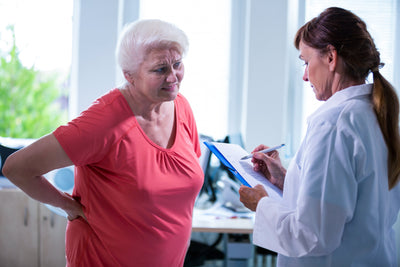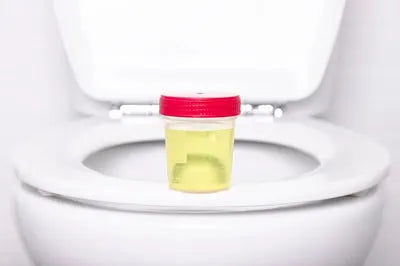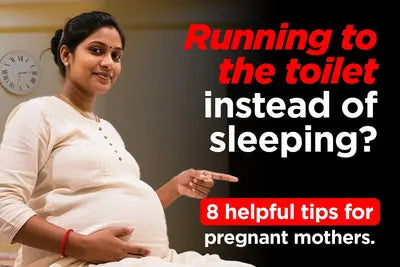UTI Cramps – What Are They & How to manage Them?
Are you feeling cramps in your tummy but not sure what they are? It feels like PMS cramps, but it’s certainly not that time of the month for you. So, what else could it be?
Did you know that women often mistake urinary tract infection cramps for their period cramps?
What Is a Urinary Tract Infection (UTI)?
A UTI or a Urinary Tract Infection is caused when bacteria from your genital or anal area enter your urinary tract.
Your urinary tract is made up of your bladder, urethra, ureters, kidneys, and urethral sphincter muscles. A UTI can affect any of these parts of your urinary tract. A UTI which spreads to your kidney is considered being the most dangerous.
UTIs are also more common in women than men. This is because of the female anatomy; the bladder is very close to the urethra.
Older people are also at a higher risk of UTIs because of various issues, like constipation, urinary incontinence, and urine retention in the bladder.
Older adults often manage incontinence issues by wearing diapers. Your diapers might be causing you to have UTIs. To prevent UTIs and cramps caused by diapers, do the following:
- Air out your diaper area
- Change diapers at regular intervals of time or whenever they are soiled
- Choose diapers that are absorbent enough and contain an anti-bacterial layer.
You need Friends Adult Diapers because they:
- Absorb all your urine flow
- Lock the liquid in gel form to prevent any moisture
- Have an antibacterial top layer
- Contain the goodness of Aloe Vera extracts to calm your skin and prevent inflammation
How Common Are Urinary Tract Infections?
According to an article published by the Cleveland Clinic, Urinary Tract Infections (UTIs) are pretty common, especially in those Assigned Female At Birth (AFAB). Here's a breakdown:
- About half of AFAB individuals experience a UTI at some point.
- UTIs can also happen to those Assigned Male At Birth (AMAB) and children, though less frequently (1% to 2% in children).
- Despite being common, UTIs are a big health concern, leading healthcare pros to treat 8 to 10 million patients yearly.
This high prevalence highlights the need for awareness and proactive steps to manage and prevent UTIs across different groups. Keep in mind that UTIs can impact everyone, and it's essential to stay informed about preventive measures.
Urine Infection Symptoms and Causes
Understanding UTI symptoms and their underlying causes is crucial for timely intervention, personalised medical assistance and UTI pain relief. Explore the symptoms and causes outlined below to enhance your awareness and promote proactive health practices.
Some of the most common UTI symptoms are:
- Inflammation in the urinary tract lining
- Pain in flank, abdomen, pelvic area, or lower back
- Pressure in the lower pelvis
- Cloudy, foul-smelling urine
- Urinary incontinence
- Frequent urination
- Urge incontinence
- UTI stomach pain
- Painful urination (dysuria)
- Blood in urine (haematuria)
Other UTI-associated symptoms: - Pain in the penis
- Fatigue
- Fever
- Chill
- Nausea and vomiting
- Mental changes or confusion
Causes of UTI:
- Microorganisms, typically bacteria, enter through the urethra
- Sex or pregnancy
- Kidney stones or enlarged prostate
- Weakened immune system
- Poor hygiene or improper cleaning of the genital area
- Holding urine for long periods
- Not having an adequate amount of water
UTI Cramps – What Are They?
Can UTI cause cramps? Yes, they can!
In fact, cramps during UTIs are extremely common. You might feel cramps in your lower back or pelvic region. UTI cramps feel like somebody is putting pressure on that area, or a feeling of soreness is experienced. The pain you experience is because the bacteria has invaded your urinary tract, and it is wreaking havoc in the form of inflammation and irritation.
UTI cramps can be accompanied by other symptoms like:
- Burning sensation when you pee
- Blood in your urine
- Urine that smells really bad
- Feeling the urge to urinate very frequently
Are Cramps a Common Symptom of UTI?
Ever wondered, 'Can a UTI cause cramps?' Well, the answer is a definite yes! UTI symptoms can feel like cramps, aches, or pressure in the lower belly or back. This discomfort happens because pesky bacteria decide to party in your urinary tract, causing irritation and inflammation.
Let's break it down:
- UTI Belly Woes:Bacteria invasion can lead to cramp-like feelings in your pelvic area or lower back leading to abdominal pain with UTI.
- Unwanted Guests:These bacteria thrive in the friendly environment of your urine, causing more trouble.
So, if you're wondering about those tummy troubles, a UTI might just be the culprit. Time to listen to your body and consider reaching out to a healthcare provider if these signs sound familiar!
UTI Cramps vs Period Cramps
It's important to understand the difference between UTI cramps and menstrual cramps to handle discomfort properly. UTI cramps, typically in the pelvic or lower back, come from pesky bacteria causing inflammation in the urinary tract lining. Watch out for signs like burning during urination, frequent bathroom trips, or cloudy urine.
For better understanding, we have listed the key points of both:
UTI Cramps:
- Felt in the pelvic region or lower back.
- Caused by bacterial invasion into the urinary tract lining, leading to inflammation.
- Associated with symptoms like a burning sensation during urination, frequent urination, cloudy or foul-smelling urine, and a persistent urge to urinate.
Period Cramps (Dysmenorrhoea):
- Associated with the menstrual cycle and involves the contraction of the uterus.
- Typically centred around the lower abdomen.
- May be accompanied by other menstrual symptoms like bloating and mood changes.
Recognising these distinctive features is vital for accurate identification and appropriate management of either UTI or period-related discomfort. Consultation with a healthcare professional can provide personalised guidance and ensure effective treatment.
How to Lower Your Risk of Contracting Urinary Tract Infections?
You might be able to save yourself from a UTI by taking some preventive measures as follows:
- Get enough fluids into your system to prevent UTIs.
- Don’t hold your urine; it can promote the growth of bacteria.
- Avoid feminine hygiene products, especially if they are scented. Ladies, your feminine parts are naturally equipped to take care of themselves and clean out any impurities. Using these products can disrupt the natural balance, also increasing the risk of UTIs.
- Wear loose-fitting, cotton clothes to keep the area well aired and prevent bacterial growth.
- Clean up your genitals after having sexual intercourse, or better yet, just take a shower.
- After pooping, wipe your butt cheeks from front to back, especially the females. Your urethra is really close to the anal opening; the bacteria can get to it quickly and spread infections.
Solution for UTI Cramps: How to Get Rid of UTI Cramps?
How to get rid of UTI pain relief at home? It’s not that difficult, really, if you were cognizant of your UTI symptoms as soon as they started.
A few things that might help are:
- Drink loads of water – Drinking water can help flush out the bacteria from your body. It also helps in diluting the urine. You are most likely to be rushing to the bathroom every two minutes if you have contracted a UTI, so this will also keep you hydrated.
- Heating pads – Use a heating pad to ease UTI cramps in your lower back and abdominal region.
- Over-the-counter medications – A UTI can cause a lot of pain and discomfort. Try over-the-counter medications like ibuprofen, naproxen, and acetaminophen to ease the pain.
- Antibiotics – You can consult a doctor who might ask you to take some antibiotics. But be sure to not leave the medicine course halfway as it might lead to you getting the UTI again.
Pain in your nether regions might not necessarily be a symptom of a UTI. Some other conditions that can cause you to experience painful cramps are sexually-transmitted diseases, kidney stones, endometriosis, uterine fibroids, etc. Therefore, it becomes extremely important to let your doctor be the judge and prescribe tests and medications for your specific concerns.
When Should I Go To the Doctor for UTI?
If you observe any of the urine infection symptoms mentioned above, including UTI cramps, it's a good idea to see your doctor and seek medical help to avoid health deterioration. Don't wait too long! UTIs can get worse if they aren't treated quickly. Your doctor can help you feel better with the right treatment.
Read more: Top 10 Home Remedies for UTIs
FAQs
Can you get UTI from your fingers?
No, UTIs are generally not contracted from contact with fingers. UTIs usually result from bacteria entering the urinary tract through the urethra. However, good hand hygiene can help prevent bacterial spread and reduce the risk of infection.
Can UTI cause cramps?
Yes, a UTI can cause cramps, often felt in the pelvic area or lower back, resulting from inflammation in the urinary tract lining.
Can UTI feel like menstrual cramps?
Yes, a UTI can cause menstrual cramps and pelvic discomfort, but accurate diagnosis is crucial, and consulting a healthcare professional is recommended for persistent or severe symptoms.
How do you get rid of UTI cramps?
To relieve UTI cramps, consult a healthcare professional for antibiotics, stay hydrated, and use a heating pad. Do not go for self-medication; rather, seek professional help for appropriate diagnosis and treatment.
What do UTI cramps feel like?
UTI cramps are often described as discomfort or pain in the pelvic area or lower back, resulting from inflammation in the urinary tract lining.
















